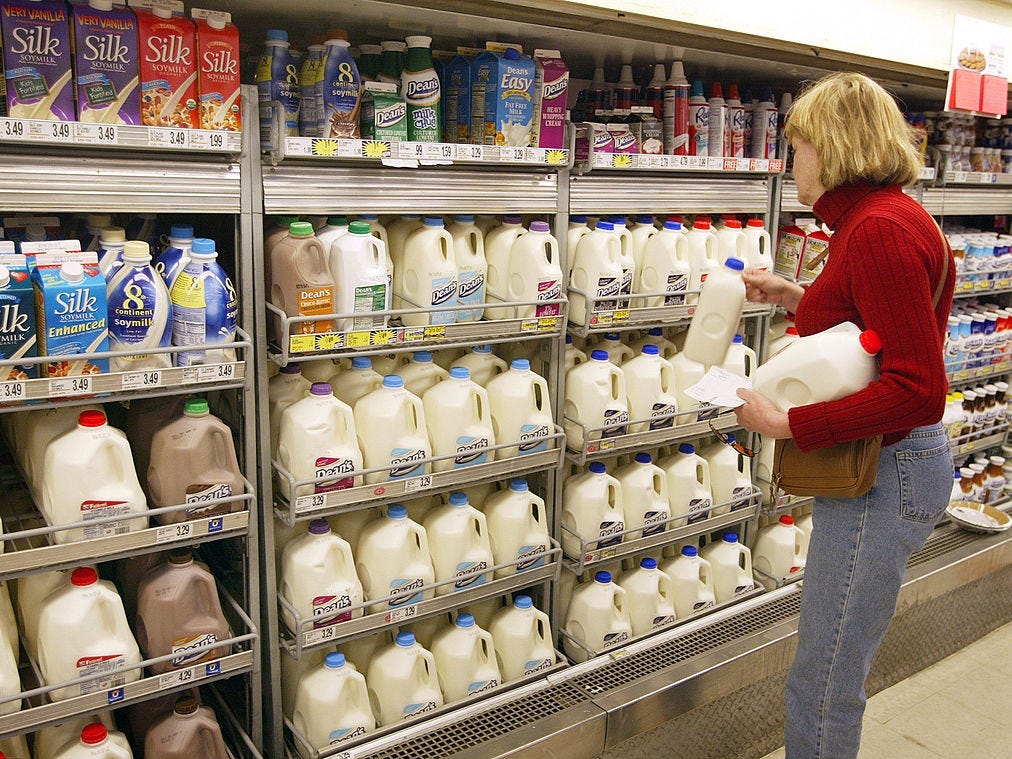
Tim Boyle/Getty Images
- A group of researchers in the UK is calling for vitamin D to be added to common foods like bread and milk to help fight the coronavirus pandemic.
- As many as 50% of UK residents are deficient in vitamin D, research shows, and there’s evidence that getting enough of the nutrient can help prevent severe viral infection.
- In countries like the US, Canada, and Finland, milk is already fortified with vitamin D, but many people still don’t get the full recommended amount for optimal health.
- Visit Insider’s homepage for more stories.
A group of researchers in the UK are calling for the government to encourage vitamin D supplementation in common grocery items like bread and milk, citing evidence that the nutrient can help fight the coronavirus pandemic.
Dr. Gareth Davies, an independent medical researcher, is among a group of scientists that have been investigating the role of vitamin D in COVID-19 prevention for months, and are now urging officials to take action, The Guardian reported.
The UK is currently facing a second round of lockdowns and a growing number of infections. As many as half of all UK residents may be deficient in vitamin D, and research suggests vitamin D deficiency could be a factor is severe COVID-19 cases.
The human body naturally produces vitamin D in response to sunlight, and it’s also found naturally in foods like fatty fish and egg yolks. Countries like the US already fortify milk and similar products with vitamin D, and residents of those nations get a substantial amount of the nutrient from fortified foods.
But many people could still benefit from supplementing, experts say. Davies has previously recommended that every adult get 4,000 IUs of vitamin D per day, 10 times the current dose recommended by health officials.
Extensive evidence links adequate vitamin D to better coronavirus outcomes
Davies led previous research, released as a pre-print in June, which found getting enough vitamin D could significantly improve COVID-19 outcomes, particularly in vulnerable groups such as the elderly.
There's since been even more studies supporting the theory that vitamin D could be beneficial against the virus.
A small study published last month found that coronavirus patients who were given a highly potent form of vitamin D were significantly less likely to need intensive care, and none of them died. That indicates the nutrient could reduce the severity of COVID-19 infection and lower the risk of complications, the researchers said.
Multiple studies have found an association between vitamin D levels and COVID-19 outcomes, although they did not establish a causal link.
A study published in September found that patients with sufficient vitamin D were significantly less likely to face dangerous complications of the virus, such as difficulty breathing or unconsciousness. And another small study found people with a vitamin D deficiency were twice as likely to be infected in the first place.
While this growing body of evidence is promising, more research is needed to better understand how vitamin D could play a role in preventing infection, or helping to heal patients.
At least one study found no apparent connection between the nutrient and the virus. It's well-documented that large doses of vitamin D aren't a cure-all for this or any other illness, and can in fact have serious side effects.
Countries like the US, which do fortify milk, still get less vitamin D than recommended
Research has also shown that vitamin D deficiency is a global issue that can cause serious health problems, including weakened bones and a dampened immune system.
As researchers like Davies have said, fortifying common foods like milk and bread can help.
In countries that already fortify milk, including the United States, Canada, and Finland, residents get a significant amount of their daily vitamin D from those products, according to research.
In the US, nearly all commercial milk is fortified with vitamin D and has been since the 1930s. Still, even many Americans don't get enough vitamin D, according to data.
That's led health officials such as Dr. Anthony Fauci, the director of the National Institute of Allergy and Infectious Diseases to recommend supplementing vitamin D, particularly in the winter when fewer people spend time outdoors in the sunshine.
Read more:
There's new evidence vitamin D may help treat COVID-19 by reducing the severity of infection
